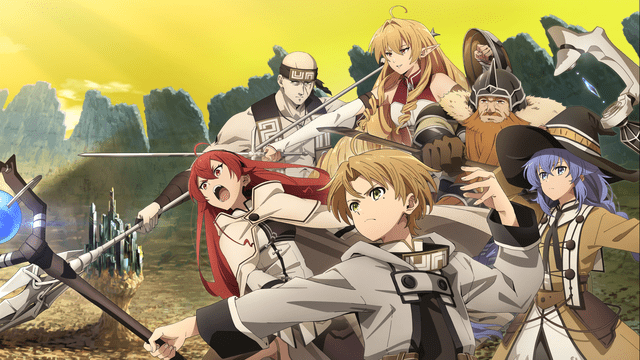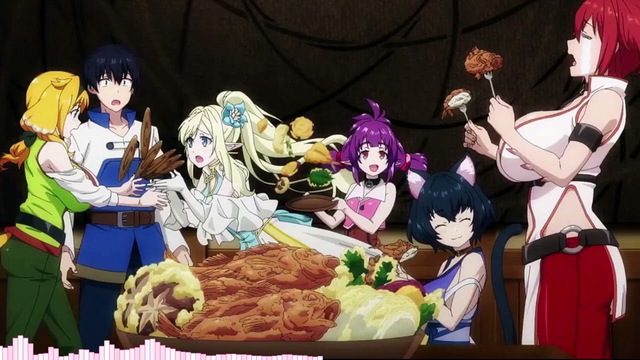The author of “Mushoku Tensei: Jobless Reincarnation” (translated as “Jobless Reincarnation: A Different World Where I Can Seriously Live My Life”), Rifujin na Magonote, has recently published an intriguing article online. The content of the article delves into the literary works that have influenced him throughout his writing career.

Below is a list of 16 works that Rifujin na Magonote has referenced and his reasons for their significance:
1. Zero no Tsukaima (The Familiar of Zero)
I know that in the first volume (or the first chapter), at least one event must occur. I remember telling a friend in high school, ‘Zero no Tsukaima made the story development much more exciting!’ However, no one understood me very well; it remains one of my fondest memories!
2. Bakemonogatari
I learned that if every line of text has something intriguing, the subsequent paragraphs will be even more engaging. If you can write something captivating in a single line, you can create a legend. Although I still don’t know if I can create something as compelling.
3. Neko no Chikyuugi (Cat Planet Cuties)
This shows that you can have intense battle scenes even in a light novel. I’m not particularly fond of battles in books, but this one demonstrated how well it can be done. I have read it multiple times to grasp the author’s writing style.
4. Pulp Fiction
I learned that the main character’s survival is not guaranteed. If you break the rules, it can lead to unexpected outcomes and even tragic consequences. This adds an extra layer of tension to the following scenes.
5. Anpanman
This taught me that no matter who you are, regardless of age, anyone can appreciate a good story. There are writing styles that are difficult to grasp for a newcomer, but I want my work to be something that anyone can enjoy.
6. Accel World
I learned that following a structured narrative is crucial. Especially when it comes to pacing, it’s better not to make it too complex but rather to keep it understandable.
7. Hoshi no Samidare (The Devil is a Part-Timer!)
He taught me that growth is essentially change. When something changes, the character’s actions will also change, and those changes will open new paths, even if they may lead to negative outcomes.
8. One Punch Man

I learned that if the main character is the strongest, the story should not focus on who is the strongest. The core of the story should be something entirely different.
9. Konya no Sikorski
He taught me that even the most mundane dialogue can sound profound if you say it with confidence. This adds an extra layer of humor to the story!
10. Melty Blood and Other Fighting Games
I learned the true meaning of hard work. Even if there are flaws or setbacks during the journey, they won’t make you the best. You must work hard and continuously improve.
11. Isekai Meikyuu de Harem wo (Harem in the Labyrinth of Another World)

This work shows me how to write a web novel that stands out in the genre. It serves as a perfect example of how to create an engaging story for this format.
12. Momoero Noumu Chuuihou!
This taught me that even when the hero is a typical character, transforming the main character into an intriguing figure can create a captivating narrative. A protagonist without personality will easily be forgotten!
13. Soukou Akki Muramasa
This reminds me that not every battle needs to be fast-paced. Sometimes when a battle slows down, it can feel more intense and decisive, especially when it’s conveyed through writing.
14. Rance Series
This series presents a completely chaotic world. It teaches me that absurd elements can be significant to the story, and characters can behave in ways that completely defy conventional expectations.
15. Muv-Luv Series
I learned the importance of creating impactful narratives. It’s crucial to build a daily life filled with happiness. The happier you are in your daily life, the more impactful your story will be when changes occur.
16. Kodoku no Gourmet (Solitary Gourmet)
This shows that a unique writing style can leave a lasting impression on readers. Although this may just be a side commentary, I enjoy how the phrase “The soup is completely empty” can convey deep emotions.
In conclusion, the author reflects on how every writer can learn from their experiences with these works, recognizing the recurring patterns in various literary pieces, contributing to ongoing development in their field.
The insights provided by Magonote offer a profound perspective on how diverse works influence different storytelling methods, from classic literature to popular manga. It helps shape the narrative of a successful series such as “Mushoku Tensei”. The sheer admiration for this work suggests a higher appreciation for the author’s ability to weave together a captivating and engaging story.
By Somoskudasa





















